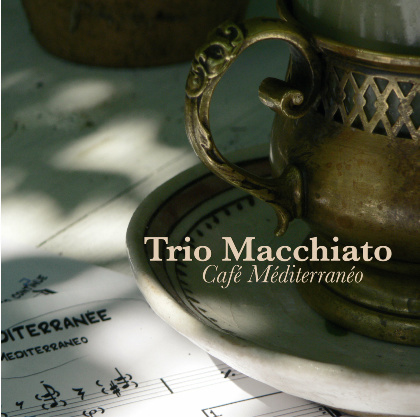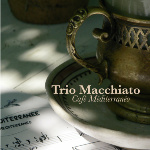- country:Russian Federation
- style(s):Pop, Tango
- label:Herzog Records GmbH
- type:Band
- artist posted by:Hausmusik
Links
The history of coffeehouses is as changeful and multicultural as the history of coffee. They began their triumphant succes in Istanbul in the 16th century, and spread via Venice to London, Vienna, and Paris. In many places, literature, vaudeville and music developed to be the aromatic dark beverage's cultivated companions. In Vienna, musicians were hired at Café Bellevue for the first time in 1788; in Paris, the "café concerts" became a regular institution. These days, as the history of coffeehouses is continues in lounges, café bars, and the branches of large corporations, the consumption of coffee is not only connected to cool club sounds. Nostalgia is being cultivated on a high musical level, not in a museum-like manner, but by creatively refining the long standing – just like the coffee culture of the early 21st century does. The ensembles reflect all the geographical colors of café history in their repertoire. The German-Russian Trio Macchiato is among the masters of this profession, and now provides an insight into its fascinating treasure chest. "Café Mediterranéo" invites everyone on an amusing, relaxed, yet dynamic and stimulating trip and shows us how to enjoy café au lait, latte macchiato, mocha or mélange with musette-waltzes, gypsy and Balkan fire, tango melancholia, and canzone charm.
The three thoroughbred musicians know how to play the most diverse facets of entertainment with wit and virtuosity: they take their listeners on a walk along the Seine river with accordion sounds, looking for a nice little bistro, listeners will find themselves under the arcades of and Adriatic café, and finally sink into the plush furniture of a Viennese coffeehouse with romantic violin playing. Slavic tunes, sometimes wild, sometimes lugubrious, blend with the aromas from the cup as well as Piazzolla sounds from the opposite side of the globe.
The musicians' aplomb in handling different folks' music is no accident: all three of them are accomplished experts with a lively previous history. ViolinistJana Mishenina draws from the wells of jazz as well as eastern European and Afro-Cuban music. She received her training at the Moscow conservatory and in Amsterdam, later she contributed her virtuoso bow stroke to the performances of the Philharmonie der Nationen and Concerto Grosso in Frankfurt. With her own ensemble she has explored universes of sound between Georgia, Slavic countries, Latin and Modern Jazz. Jakob Neubauer was part of her band, and now he is in charge of all bantling instruments from accordion to bandoneon. He is the second Russian soul of the trio, originally coming from St. Petersburg, where he won the Great Russian Accordion Contest three decades ago. Via guest performances on stages in London, Paris, and Berlin, his path led him to his new home Hamburg – successfully: the Staatsoper and the Schauspielhaus are only two of his illistrious fields of activity. Bassist Henry Altmann as the third member, adds a cosmopolitan German impulse to the band. He is a citizen of the world with his family's roots in the rural German region of Allgäu, he spent years studying and living in New York and Paris, and working at Staatstheater Dresden. As a musical partner his panoply includes everything from George Gruntz to Herman & Tietjen. The three-way companionship is refined with swift hand percussion by Yogi Yokusch and discreet string work by guitarists Werner Neumann and Harald P. Bohner.
Live performances by Trio Macchiato are unfortettable experiences for all the senses. The musicians are equally welcome guests in the famous restaurant Esskultur in the middle of Hamburg St. Pauli and on the cruise ship MS Bremen. So it was about time to put this felicitous wedding of enjoyable music and coffeehouse culture on CD.
Fleet-footed and zestful, with arrangements that show a great fondness for details, the Trio takes us on a diverse and tasteful trip for the ears, from Budapest to Buenos Aires. There are classics of French accordion literature that conjure up the golden days of Rue de Lappe and its Bals Musettes, like Gus Viseur's swinging "Flambée Montalbanaise", there is "Rhythm Gitans", a piece written by Jo Privat, laced with Manouche sounds. "Suite Méditeranée" honors the unique French film composer Antoine Duhamel with finesses in the arrangement, with glockenspiel and violin pizzicato. Gypsy-style whirling flights of bows and keys elate in "Marjanja", "Solnishka" then turns out the yearning, soulful side of this genre – here Jana Mishenina is right at home as a singer. The piece "Ausencia", co-written by Goran Bregovic and Creole Teofilo Chantre, builds the bridge from the Balkans to the New World. Here, Mishenina again performs as a vocalist along with a sighing accordion. The Rio de la Plata sends his best wishes with Piazolla's sophisticated "Libertango", wildly interpreted by the Trio with flying sparks. The Mediterranean sun sparkles in the violin passion on "Sole, Sole, Sole" by Arturo Casadei. His compatriot Paolo Conte's "Azzurro" can be found in an arabesque-laced version with a pensive undertone that has nothing whatsoever to do with Adriano Celentano. Mecano's hit "Hijo De La Luna" from the 1980's turns into a twinkling gem, blowing in the night's breeze.
The Trio is also glad to share its own compositions: Jakob Neubauer's "Baby Capuccino" is an amusing, almost chirpy homage to the creamy little drink and has got what it takes to become a new standard between Montmartre and the Mediterranean. "Il Giardino Degli Aranci" is an Italian midsummer night's dream; Henry Altmann sketches a waltz pastel in the tender colors of the south. Finally, "Shalakho", written by Mishininas Georgian colleague David Malzonia, comes along snappishly with some oriental additions.
A dazzling imaginary trip between the shimmering light of the south and the inscrutable expanses of the east, between little bars with their colorful canopies and the sophisticated salons of capital cities – may you enjoy it with or without a coffee cup at your side.



